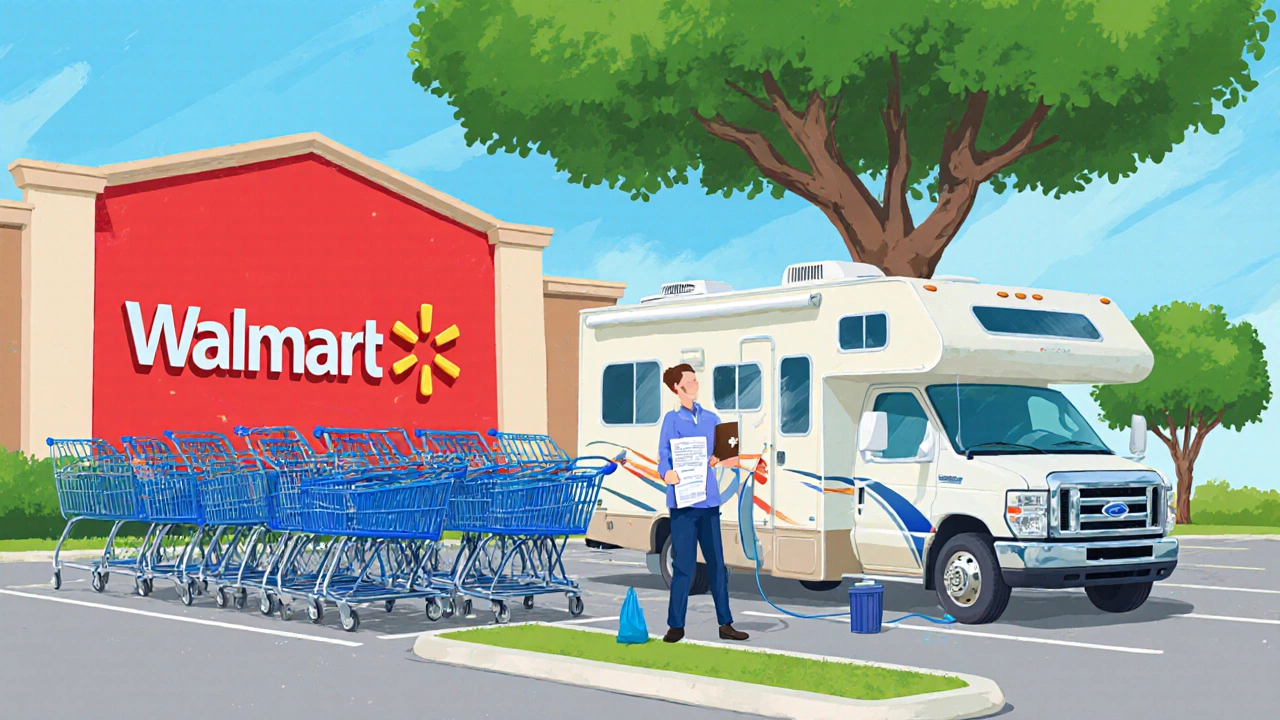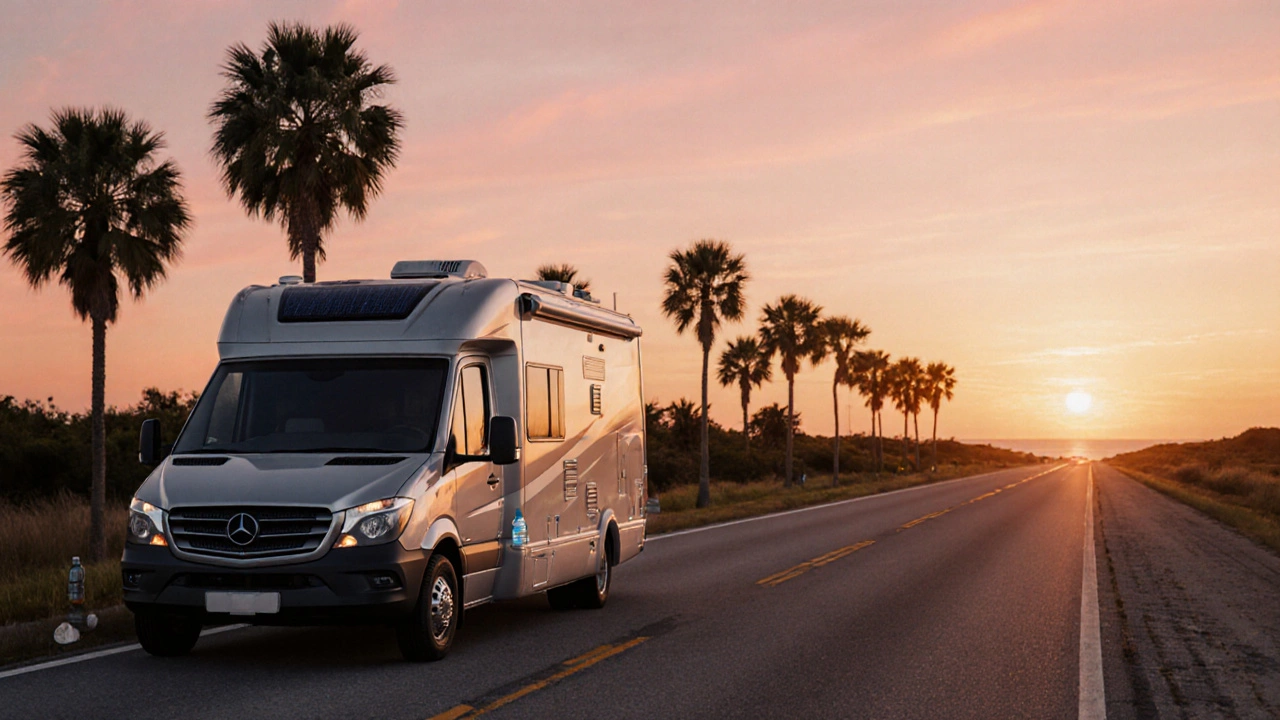Florida Boondocking Spot Checker
Boondocking Legality Result
Location Details
State Parks
Free, but overnight stays in campgrounds require reservations. Drive-through areas may allow short stops.
24-hour limit No overnight stays without reservationForest Service Lands
Free dispersed camping, but limited to 14 days per season.
14-day limit Fire bans may applyRetail Parking
Free, but typically limited to 12-hour stays. Requires manager approval for longer periods.
12-hour limit Manager approval neededTruck Stops
Free access, but may have 24-hour limits and peak hour restrictions.
24-hour limit Peak hour restrictionsPrivate Land
Free or low-cost with owner permission. Rules depend on the landowner.
Owner permission required Varies by ownerEver wondered if you can park your motorhome on the Sunshine State’s roads without paying a dime? Florida boondocking is the practice of staying overnight in an RV or motorhome on public or private land where no hook‑ups are provided. In plain English, it’s free or “dry” camping. Below you’ll learn the legal basics, the most reliable spots, essential safety tips, and the common pitfalls that trip up even seasoned travelers.
Legal Landscape: What Florida Says About Boondocking
Florida’s laws about overnight stays are a patchwork of state statutes, county ordinances, and private‑property rules. The key authority is the Florida Department of Environmental Protection (FDEP), which governs parking on state‑owned land, especially in state parks and wildlife management areas. Generally, you cannot camp on state park property unless you’ve booked a campsite; overnight parking in “drive‑through” areas is considered a violation.
County ordinances often mirror state law but can be stricter. For example, Miami‑Dade and Broward counties enforce a 24‑hour limit on parking in most public streets without a permit. Rural counties like Citrus or Marion are more relaxed, allowing overnight stays on designated rest areas or truck stops.
Private property-shopping‑center parking lots, Walmart stores, Cracker Barrel restaurants-are not governed by FDEP. Here, the rule of thumb is to ask permission or follow the chain‑of‑command signage. Most retailers permit 12‑hour stays for RVs, provided you’re not obstructing traffic.
Where to Boondock in Florida: The Real‑World Options
Below is a quick‑look table that breaks down the most common boondocking locations you’ll encounter in Florida.
| Location Type | Typical Access | Cost | Amenities | Common Restrictions |
|---|---|---|---|---|
| State Parks (drive‑through) | Public roads inside park boundaries | Free | None - dry camping only | 24‑hour limit, no overnight stays in campgrounds without reservation |
| U.S. Forest Service lands (National Forests) | Designated forest service roads | Free | None - must be self‑sufficient | Stay ≤14 days per season, fire bans may apply |
| Private Retail Parking (Walmart, Cracker Barrel, etc.) | Lot entrance of participating stores | Free | Restroom access, some have electric hookup (rare) | 12‑hour limit, manager approval required for longer stays |
| Truck Stops & Travel Centers | Major interstates and highways | Free (some charge for premium hookups) | Showers, dump stations, Wi‑Fi | 24‑hour limit, no overnight parking during peak hours |
| Private Land (Campers willing to share) | By arrangement with landowner | Free or small fee | Can negotiate hook‑ups, pet‑friendly | Depends on owner’s rules; always get written permission |

Permits, Fees & Restrictions You Must Know
Even when a spot is technically free, you may still need a permit. Here’s a cheat‑sheet:
- State Park Day‑Use Pass: Some parks require a day‑use fee ($2‑$5) for any vehicle entering the grounds, even if you’re just pulling over.
- County Overnight Parking Permit: Counties like Orange and Pinellas issue $10 permits for 24‑hour stays on public streets. Apply online through the county’s website.
- Fire Restrictions: During red‑flag warnings, the Florida Forest Service may close all dry‑camping areas. Check theFlorida Fire Weather Watch before heading out.
- Vehicle Length Limits: Many city streets cap RV length at 30ft. Exceeding that can lead to a citation.
Breaking any of these rules typically results in a small fine (often $50‑$150) and a warning that you must move immediately.
Practical Tips for a Smooth Boondocking Experience
Free doesn’t mean careless. Follow these best‑practice steps to stay safe, comfortable, and welcome.
- Plan Water & Waste Ahead - Carry at least 20gallons of fresh water per night for a family of four. Use public dump stations at truck stops to empty gray and black water before you hit a remote spot.
- Power Management - A quality solar panel (150‑200W) plus a deep‑cycle battery can keep your lights, fridge, and devices running. If you’re near a retail lot with electricity, ask the manager if a short‑term hookup is allowed.
- Leave No Trace - Pack out all trash, flatten any campfire residue (if fire is permitted), and avoid damaging vegetation. The Leave No Trace principles are the social contract for boondocking.
- Security - Choose well‑lit spots, lock your doors, and use a motion‑sensor alarm if you have one. Many retirees in Florida enjoy the peace of a quiet lot, but a quick walk‑around each night helps you spot any issues.
- Know Your Neighbors - In retail lots, be aware of store operating hours. Some locations ask RVers to move before the store opens to keep traffic flowing.
Common Mistakes and How to Avoid Them
Even seasoned boondockers slip up. Here are the top three and how you can stay ahead:
- Assuming All Public Roads Allow Overnight Parking - Always check signage. A “No Overnight Parking” sign trumps any personal assumption.
- Running Out of Batteries - Test your power system before a long leg. A simple 12‑volt volt‑meter tells you if you’re under 50% capacity.
- Ignoring Local Ordinances - County websites often publish PDF guides titled “RV Parking Regulations.” A quick search saves you from costly tickets.
Quick Boondocking Checklist
- Verify the spot’s legal status (state park, retail lot, private land).
- Check for fire bans or water restrictions.
- Bring enough fresh water, food, and waste‑holding capacity.
- Charge batteries and confirm solar panel alignment.
- Lock doors, set alarms, and note the nearest emergency services.
- Leave a note of gratitude for private landowners or store managers.
Next Steps: Mapping Your Florida Boondocking Adventure
Start by penciling in the regions you want to explore-whether it’s the Gulf Coast’s quiet hammocks, the central lakes district, or the panhandle’s forested backroads. Use a free app like Campendium or iOverlander to locate the spots listed in the table. Then, call ahead if you’re planning to stay longer than the usual 12‑hour window at a retailer.
Remember: the freedom of boondocking is a privilege, not a right. Respect the land, follow the rules, and the Sunshine State will keep rewarding you with free‑parking gems for years to come.
Frequently Asked Questions
Is boondocking legal on Florida state park roads?
You can park for a short stop (usually under 24hours) on state park drive‑through roads, but you cannot set up a campsite without a reservation. Violating this can result in a fine from the Florida Department of Environmental Protection.
Which retailers in Florida allow overnight RV parking?
Walmart, Cracker Barrel, Cracker Barrel, and many Truck Stop chains (e.g., Pilot, Love’s) generally permit 12‑hour stays. Always ask the store manager for permission and obey any posted signage.
Do I need a special permit for Boondocking in National Forests?
No separate permit is required for dispersed camping in the Apalachicola National Forest, but you must follow the U.S. Forest Service’s 14‑day stay limit per season and comply with fire restrictions.
What are the best safety practices for boondocking in Florida’s hot climate?
Stay hydrated, park in shaded spots when possible, use reflective window coverings, and keep your battery cool (ventilation or a battery fan). A portable evaporative cooler can make interior temperatures tolerable.
Can I dump waste at retail parking lots?
Most retail lots do not have dump stations, so you’ll need to use a nearby truck stop or a dedicated RV dump station. Some Walmart locations in other states have started offering dump services, but it’s still rare in Florida.
